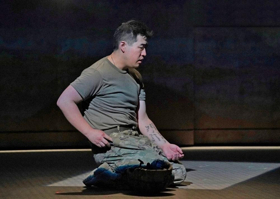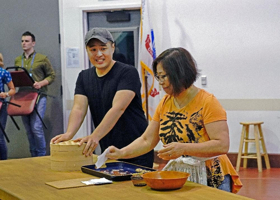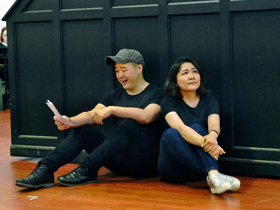Mixing Military Racism and a Mother's Love, AN AMERICAN SOLDIER Opens at Opera Theatre of St. Louis

Photo: Ken Howard/OTSL
AN AMERICAN SOLDIER--music by Huang Ruo and libretto by David Henry Hwang, directed by Matthew Ozawa--opened at Opera Theatre of Saint Louis (OTSL) on June 3, with performances through June 22, part of OTSL's New Works, Old Voices series. The opera asks the powerful question: What does it mean to be an American? It is based on the true story of a young Chinese American from New York, who enlisted in the Army during the war in Afghanistan and was deployed to Kandahar, where he became the victim of military hazing that leads to his suicide.
The artists spoke about the creation of the piece as part of the Guggenheim Museum's Works & Process series in New York, moderated by Nancy Yao Maasbach, president of the Museum of Chinese in America (MOCA) and joined by OTSL artistic director, James Robinson. This article is based on that discussion and the excerpts performed by Andrew Stenson, who also sings the role of Danny Chen in St. Louis, with soprano Fang-Tao Jiang as his friend Josephine Young and Guang Yang as Danny's mother, with Lachlan Glen on piano. (In St. Louis, soprano Kathleen Kim is Josephine and mezzo Mika Shigematsu is Mother Chen. Michael Christie conducts.)

in rehearsal. Photo: Ken Howard/OTSL
The powerful excerpts heard at the Guggenheim made the audience eager for more. As artistic director Robinson put it, "What I think these guys have created in this piece is so beautiful because David has this gorgeous, lean style that clearly inspired Ruo to write absolutely exquisite music."
One excerpt started with an exchange of letters, with Chen and Josephine singing a world apart, of the moon (an important motif in Chinese poetry) and home. The duet is melodic yet dissident and mirroring their feelings. They sang, "The moon here is so much smaller/much sadder, much less bright than the one that shone when you were in Chinatown. Wish I could see it yet one more time; I miss that moon with you."

in rehearsal. Photo: Ken Howard/OTSL
In another, Mrs Chen spewed her anger and hate for the platoon's sergeant and center of the investigation, singing: "So that is the man, that is his face. I could walk right over and spit between his eyes. What would they do? Hit me, slap me? I would hit him back right where it hurts. Nothing he could do to me--nothing anyone could do--would be worse than what they have already done."
Despite its shocking nature, the story is unfamiliar to many--even Hwang was only somewhat familiar with it--but cut too close to the bone for many in Chinese American community. Hwang was originally approached by Liz OuYang (Massbach's predecessor at MOCA) to turn it into a play but didn't feel it was the right project "for his wheelhouse." At the same time, Ruo, who came to this country when he was 18 and was a longtime friend of Hwang, was offered a commission by Francesca Zambello at the Washington National Opera for a one-act opera. Her only stipulation: It had to be on an American theme.
Ruo and Hwang had been looking for a project to do together and, Hwang recalled, "I thought that the Danny Chen story might make a good opera because opera deals with big themes, epic themes, and is very comfortable dealing with tragedy, death and with love." Ruo added, "So I needed to look for an American story--and this is one that's as American as it should be. I wrote back to her and she approved it right away. So that was the start of the chamber version of American Soldier, which took place in 2014.
Creating a very current story--Chen's death had been in 2011 and was still very raw--into an opera, which is such an abstract, time-stretching art form, was a challenge. A key element for Hwang was meeting Chen's family. "We didn't want to do this without the cooperation and the blessing of the family was... that there are many questions that are still current and alive: In this case, it involved the ultimate tragedy that can befall a parent, to lose a child. It was important to feel to get the blessing of the family."
What did Ruo mean by "this is an American story as it should be"? He elaborated: "There are many untold stories. This story has to do with racism but also what are the issues of the first generation Asian American, what are they facing, what difficulties? (Ruo came to the US as a student and remained; Hwang was born in LA.)
The one-act version from 2014 in Washington, DC, was quite different--really a separate work, said Hwang--drawing heavily on the transcripts of the trials of the soldiers in Chen's unit. In St. Louis, the story is more personal. Said Hwang, "I think the original version ended up being a docu-opera, with the libretto was built around testimony from the court martial trial; in this version for St. Louis, we've tried to deepen the characters and to give more emotion to the story.
Artistic Director Robinson had worked with Ruo at the Santa Fe Opera, on his opera about Sun Yat-Sen, the first provisional president and founding father of the Republic of China, and wanted to bring him to St. Louis. The chamber opera, however, didn't fit the company's needs. And so the seed for the two-act version was planted.
Said Hwang, "One thing remains constant between the two versions stems from the initial conversation that Huang Ruo had with Danny's parents. He speaks 4-5 dialects of Chinese; I speak none. But even he couldn't match up with Danny's parents and needed an interpreter." Ruo recalled the first meeting, hearing Chen's mother unable to finish a sentence without crying. "She couldn't say much, but she held my hand firmly and thanked me for telling her sad story to more people.
"At the end, it was the mother who was consistently and continuously was fighting for justice for Chen: the love of the mother and child relationship. I started to wonder how many operas in history were about the mother and son relationship (there's Il Trovatore, but it was different). In this case, I wanted to bring out that love between mother and son."
When moderator Maasbach asked Hwang whether, coming away from this tragedy, we understand a bit more about what being an American is, he was not overly confident.
"Honestly, I think this incident is not possible to reach its full potential to be part of the national conversation until it's known by more of the nation... This goes back to what we said at the top of this conversation, which is about stories amplified by our culture and the media and stories that remain somewhat in the shadows. This opera is an attempt to bring the story of Danny Chen into the light."
For more information about AN AMERICAN SOLDIER and tickets, visit the Opera Theatre of Saint Louis website.
###
It is ironic that AN AMERICAN SOLDIER opens the same week as the PBS airing of "The Chinese Exclusion Act," part of the "American Experience" series, directed by Ric Burns and Li-Shin Yu. It covers the 1882 legislation that was the first American law to restrict the immigration of a specific ethnic group and to deny previous immigrants citizenship. It also makes historic references to America as "the melting pot" seem like a myth--today, more than ever.
Comments
Videos

